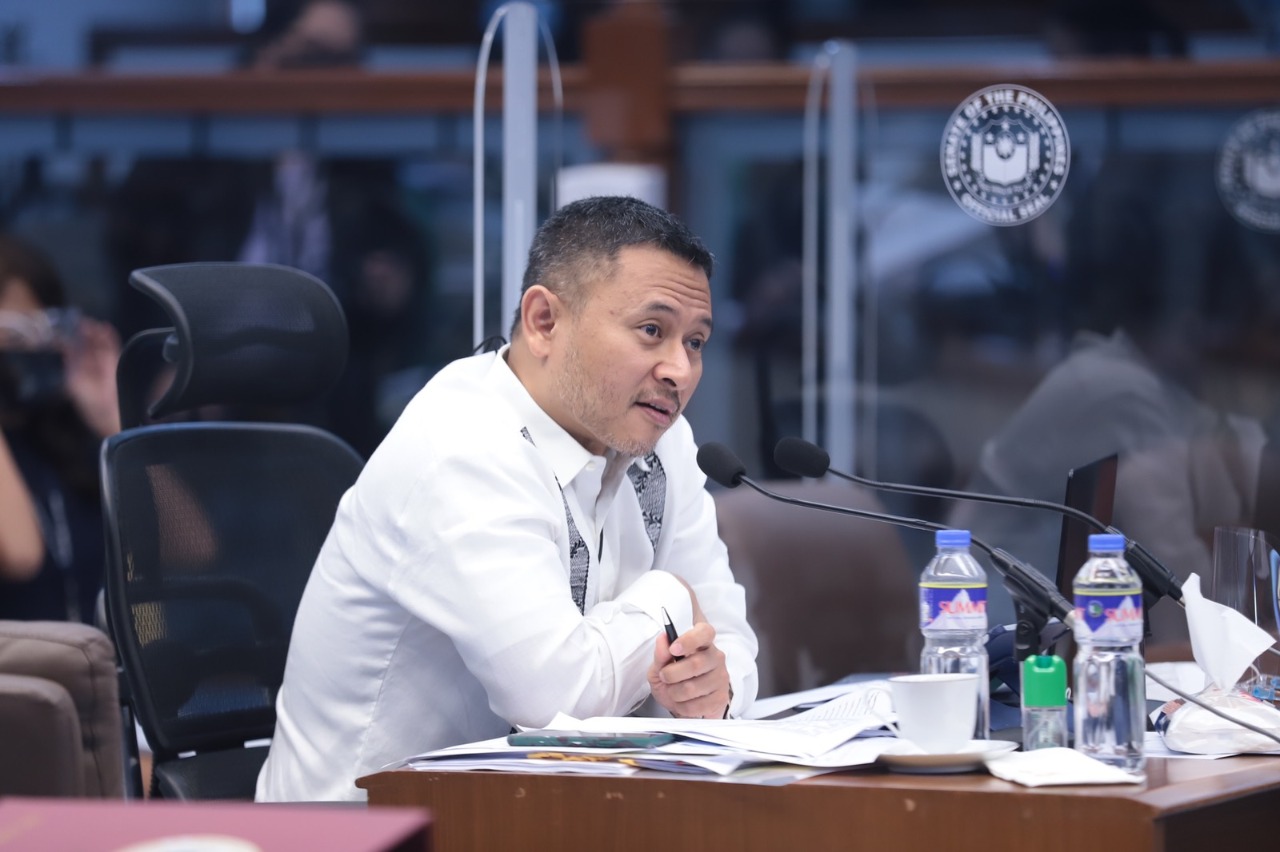Senate OKs bill expediting vaccine purchase, creating indemnity fund

ANGARA ACCEPTS AMENDMENTS TO COVID-19 ROLL-OUT PLAN: Sen. Sonny Angara, chairman of the Committee on Finance, accepts proposals from his colleagues during the period of amendments Tuesday, February 23, 2021, on Senate Bill No. (SBN) 2057 or the COVID-19 Vaccination Program Act of 2021. (Henzberg Austria/Senate PRIB)
MANILA, Philippines — The Senate on Tuesday approved on third and final reading a bill seeking to expedite procurement of Covid-19 vaccines and to establish a national indemnity fund.
Voting 22-0, the chamber passed Senate Bill No. 2057 or the proposed Covid-19 Vaccination Program Act of 2021.
Under the bill, local government units (LGUs) will be exempted from certain procurement rules under existing laws in purchasing vaccine doses for their constituents.
The measure also allows LGUs to make an advance payment of not more than 50 percent of the contract price “if required by the supplier, manufacturer, distributor, contractor or consultant.”
Article continues after this advertisementThe Government Procurement Reform Act only allows advance payment equivalent to a maximum of 15 percent of the cost of government-financed projects.
Article continues after this advertisementThe bill authorizes the Department of Health (DOH) and the National Task Force Against COVID-19 (or NTF) to “undertake negotiated procurement of COVID-19 vaccines and the ancillary supplies and services for their storage, transport, and distribution.”
Once passed into law, the national government, LGUs, and the private sector will be authorized to procure Covid-19 vaccines through the National Task Force Against Covid-19 (NTF) and the Department of Health (DOH).
But the Senate adopted an amendment creating a new provision that would let LGUs directly procure ancillary supplies and services necessary for the storage, transport, deployment, and administration of Covid-19 vaccines without going through the DOH and the NTF.
“The entire nation is eagerly awaiting for the start of the vaccination program that carries with it the promise of immunization from the Covid-19 virus that has caused so much hardship and pain to all Filipinos over the past year,” said Senator Sonny Angara, who sponsored the bill as chair the Senate finance committee.
“With this measure, we hope to see the start of the inoculation of our population, starting with the priority sectors, at the shortest possible time,” he added.
Cap on LGU purchase
Under the bill, LGUs are only allowed to purchase vaccines and supplies for up to 75 percent of their target population.
This cap may be adjusted by the Inter-Agency Task Force (IATF) for the Management of Emerging Infectious Diseases depending on the supply.
The bill further requires procuring LGUs to prioritize frontline health workers, senior citizens, and indigent persons.
The measure, however, would allow local health officials to “formulate their own vaccine recipient list and implement their own operating procedures in accordance with national policies and procedures issued by the DOH if it will expedite and enhance the efficiency of the inoculation process and prevent the spoilage of vaccines.”
Indemnity fund
Aside from expediting the purchase and administration of the vaccines in the country, the measure also seeks to establish a Covid-19 National Indemnity Fund.
The indemnity fund, to be managed by PhilHealth, will be established as a “trust fund” to compensate any person inoculated through the Covid-19 vaccination program in case of death, permanent disability or hospital confinement for any “serious adverse event.”
Under the bill, an amount of P500 million is authorized to augment the funds of the Philippine Health Insurance Corp. (PhilHealth), which will be sourced from the Contingent Fund of the 2021 national budget.
The indemnity fund will be valid and available for release and disbursement until terminated by the Philippine president based on the recommendation of the “Permanent Committee.”
This committee is composed of the Department of Finance, the Department of Budget and Management and the Commission on Audit.
Private entities
Under the bill, private entities may procure COVID-19 vaccines only in cooperation with the DOH and NTF through a multiparty agreement, which shall include the DOH and the relevant supplier of COVID-19 vaccine.”
“Any such vaccines, supplies or services procured by private entities shall be for the sole and exclusive use of such companies, without prejudice to the multiparty agreement,” according to the bill.
In an amendment proposed by Senator Richard Gordon and adopted by the Senate, the bill would also allow international humanitarian organizations like the Philippine Red Cross to procure vaccines, provided that its use is consistent with the set priority listing.
“The DOH, NTF, LGUs and private entities may partner with the Philippine Red Cross in the administration or distribution, and inoculation of the vaccines,” according to the bill.
Vaccine card
The bill initially proposed the issuance of a “vaccine passport” to inoculated individuals. This document will serve as a record of all the COVID-19 vaccinations they have received.
However, the term “passport” was replaced with “card” during the period of amendments.
The bill mandates a uniform format for the vaccine card, the contents of which shall be updated accordingly to always conform with globally accepted standards
The Senate also struck off a provision stating that those in possession of the document “may be granted certain benefits or exemptions,” including international travel as may be allowed in foreign jurisdictions, non-essential domestic travel, as well as access to business establishments allowed to operate based on IATF guidelines.
This, after several senators earlier expressed misgivings on the term “vaccine passport” and the potential “benefits and exemptions” that could come with it, saying this could discriminate and restrict the mobility of those who opt not to be inoculated.
Meanwhile, the measure penalizes the falsification of a vaccine card under the Revised Penal Code.
The Senate opened plenary debates on the bill last Wednesday. President Rodrigo Duterte then certified the measure’s passage as urgent, which allowed the chamber to approve the bill both on second and third reading on Tuesday.
The bill’s counterpart measure in the House of Representatives was approved Monday